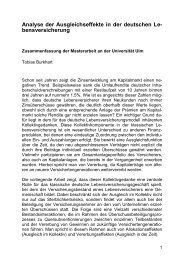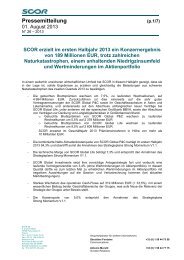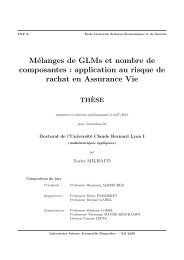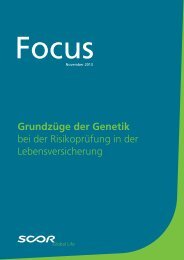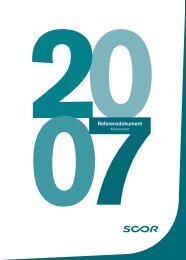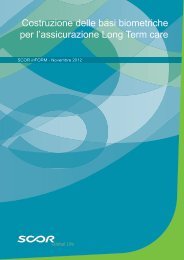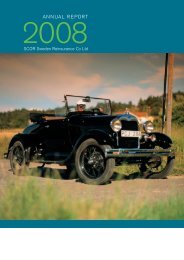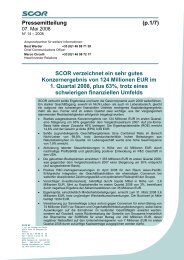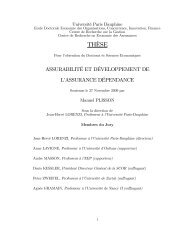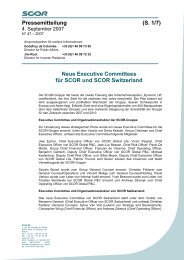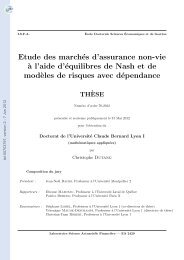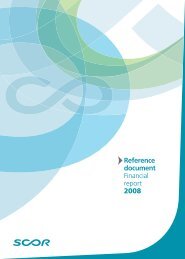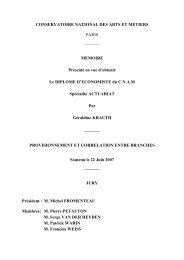4.4 Legal risk - Scor
4.4 Legal risk - Scor
4.4 Legal risk - Scor
Create successful ePaper yourself
Turn your PDF publications into a flip-book with our unique Google optimized e-Paper software.
Board of Directors’ borrowing powers<br />
Under Article L. 225-43 of the French Commercial Code, the Directors, Chief Executive Officer (Directeur Général) and<br />
Chief Operating Officers (Directeurs Généraux Délégués) may not borrow money or obtain a guarantee from the Company.<br />
Any such loan or guarantee would be void and may not be relied upon by third parties.<br />
Directors’ Age Limits<br />
Under article 10 of the Company’s bylaws (statuts), Directors may hold office until the age of 77. A Director reaching the age<br />
of 77 while in office has to retire at the expiration of the term of his or her office, as determined at the Shareholders’ Meeting.<br />
21.2.3 RIGHTS, PRIVILEGES AND RESTRICTIONS ATTACHED TO EXISTING SHARESVOTING RIGHTS (ARTICLES 8<br />
AND 19 OF THE COMPANY’S BYLAWS)<br />
Voting right (Article 8 and 19 of the bylaws)<br />
The voting right attached to shares is proportional to the portion of share capital they represent. During a period of two years<br />
from the reverse stock-split of the Company’s shares implemented on 3 January 2007, any old share gave the right to one<br />
vote and any new share to ten votes, so that the number of votes attached to the shares shall remain proportional to the<br />
portion of share capital they represent.<br />
The remaining old shares have been cancelled on 3 January 2009 and since then subject to applicable laws, all the shares<br />
of the Company give right to one voting right.<br />
At all meetings, each shareholder has as many votes as the number of shares he holds or represents without limitation other<br />
than those which may result from legal requirements and the stipulations above. The difference between the distribution of<br />
share capital and the distribution of voting rights arises from the existence of treasury shares with no voting rights.<br />
Where the shares are held by a beneficial owner, the voting rights attached to those shares belong to the beneficial owner at<br />
ordinary shareholders’ meetings, and to the bare owner at extraordinary shareholders’ meetings.<br />
Failure to observe the legal and statutory obligations concerning thresholds may be sanctioned by the removal of voting<br />
rights for those shares or rights exceeding the undeclared fraction.<br />
Statutory distribution of earnings (Article 20 of the bylaws)<br />
After approval of the financial statements and recognition of the existence of distributable funds consisting of the earnings<br />
for the fiscal year, less prior losses and plus, if applicable, any profit carried forward, the Shareholders’ Meeting shall<br />
distribute them as follows:<br />
• all sums transferred to reserves pursuant to the law;<br />
• All or part of the profit available for distribution may be transferred by the Shareholders’ Meeting to any<br />
discretionary, ordinary or extraordinary reserves or carried forward, as deemed appropriate;<br />
• Any remaining balance shall be distributed on all the shares in proportion to their unredeemed paid-up value, it<br />
being stipulated that during a period of two years starting from the reverse split operation on the shares of the<br />
Company, pursuant to the seventeenth resolution of the Ordinary and Extraordinary Shareholders’ Meeting of 16<br />
May 2006, shares which have been subject to the reverse split shall be entitled to an amount ten times greater<br />
than the amount to which shares which have not been subject to the reverse split shall be entitled.<br />
The Shareholders’ Meeting may distribute all or part of the discretionary reserves in the form of a full or partial dividend or as<br />
an exceptional distribution; in this case, the resolution shall expressly indicate the sums to be deducted from each reserve.<br />
Each share entitles its holder to a share (in direct proportion to the number and to the par value of the existing shares) in the<br />
corporate assets, the profits or the liquidation dividend.<br />
The Company’s bylaws (statuts) also provide that profits available for distribution can be allocated to one or more optional or<br />
statutory reserves or distributed as dividends, as may be determined by the Shareholders’ Meeting.<br />
Dividends may also be distributed from optional or statutory reserves, subject to approval by the shareholders and certain<br />
limitations, either as an addition to an annual dividend distribution or as an exceptional dividend distribution.<br />
The payment of dividends is decided by the Shareholders’ Meeting at which the annual accounts are approved following<br />
recommendation of the Board of Directors. If there is distributable profits (as shown on the interim balance sheet audited by<br />
the statutory auditors), the Board of Directors has the authority, subject to French law and regulations, without shareholder<br />
approval, to distribute interim dividends. Dividends are distributable to shareholders pro rata their respective holdings of<br />
Ordinary Shares. Dividends are payable to holders of Ordinary Shares outstanding on the date of the Shareholders’ Meeting<br />
approving the distribution of dividends or, in the case of interim dividends, on the date of the meeting of the Board of<br />
Directors approving the distribution of interim dividends. The actual dividend payment date and the modalities of such<br />
payment are determined by the Shareholders’ Meeting approving the declaration of the dividends or by the Board of<br />
Directors in the absence of such determination by the shareholders. The payment of the dividends must occur within nine<br />
months of the end of the fiscal year. Dividends not claimed within five years of the date of payment revert to the French<br />
Government. According to the bylaws (statuts), shareholders may decide in an ordinary general meeting to give each<br />
shareholder the option of receiving all or part of a dividend or interim dividend in the form of Ordinary Shares. The<br />
302



